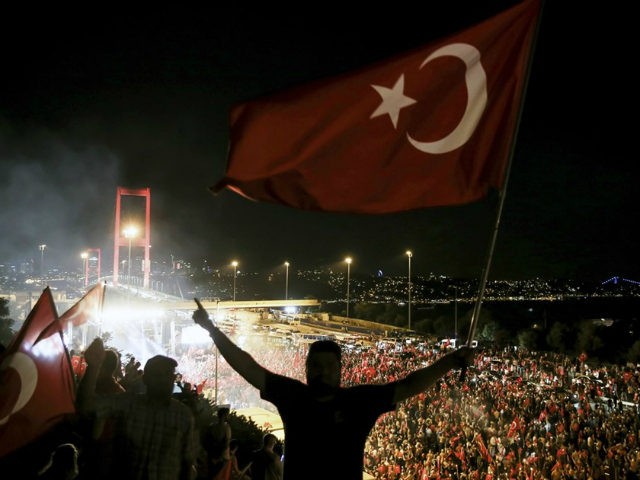Turkish Prime Minister Binali Yıldırım told the nation’s state-run Anadolu Agency on Thursday that the newly re-elected government of President Recep Tayyip Erdoğan will end the national state of emergency, imposed after a failed coup in 2016, on Monday.
Erdoğan won re-election to the presidency on June 24 in an election widely decried as unfair at best and fraudulent at worst. The election followed the shutdown of nearly 200 media organizations, leaving Erdoğan rivals largely off of television and out of print media. One of Erdoğan’s opponents, Selahattin Demirtas of the People’s Democratic Party (HDP), was forced to campaign from prison after being arrested in 2016 and charged with “terrorism” for advocating for Kurdish rights.
Turkey’s southern Kurdish areas, such as the cities of Mardin and Diyarbakir, have been hit hardest with the state of emergency. While Erdoğan blames the America-based Islamic cleric Fethullah Gulen for the coup, he has also accused Kurds in the nation’s south of harboring the Kurdistan Workers’ Party (PKK), a U.S.-designated Marxist terrorist organization, and imposed further restrictions like curfews and military checkpoints throughout Kurdish areas.
Erdoğan’s re-election completes a transition from a parliamentary to a presidential system that began with a referendum in 2017. The office of prime minister will no longer exist, and Erdoğan will receive sweeping executive powers without checks written into the Turkish Constitution to compensate. Thanks to the state of emergency, Erdoğan has already been exercising special legislative powers by decree for almost two years.
As Kurdistan 24 notes, Erdoğan largely used his decree power to remove anyone believed to be associated with Gulen from public life. “Since last year, decrees have purged over 100,000 civil servants and ordered the closure of hundreds of media outlets, NGOs, cultural centers, private schools, and hospitals,” the outlet recalls. Turkish police have also arrested hundreds of politicians, teachers, and others with public voices for criticizing the regime.
In his remarks Thursday, Yıldırım announced that, in addition to Erdoğan’s inauguration, “the new cabinet will be announced on Monday, and the state of emergency will conclude.” Yıldırım said the government will replace the state of emergency with a new decree that “will include necessary measures to avoid vulnerability in the area of counterterrorism once the state of emergency is over.” He did not specify, however, what the contents of the decree would be or who it would affect in the country.
The Turkish newspaper Hurriyet did not report the Monday deadline for the state of emergency, instead highlighting that Yıldırım promised the decree replacing the state of emergency would come down by Friday.
“We will issue a final decree law tomorrow,” Yıldırım noted, adding that the state of emergency would expire on July 18 if the government did nothing, three days after the second anniversary of the failed coup against Erdoğan.
Erdoğan had begun hinting shortly before the June 24 elections that he would rescind the state of emergency shortly after adopting presidential powers when he won re-election, which would largely render the state of emergency powers useless.
There is little sign that the change will affect southern Turkey, where Erdoğan had imposed a new curfew on the Kurdish-majority population as recently as February to “neutralize” the PKK.
The events leading up the state of emergency began late July 15, when a group of military leaders appeared to take Ankara by storm and issued a public message confirming that secularists in the military had “seized the rule of the country completely with the aim of reinstalling the constitutional order, democracy, human rights and freedoms.”
In a dramatic turnaround, Erdoğan regained control of the country by appearing on television from an undisclosed location via FaceTime and appealing to supporters of his Islamist Justice and Development Party (AKP) to take to the streets and attack soldiers. The soldiers ultimately surrendered, with many fleeing the nation to neighboring Greece, leaving a death toll of 249 people from both sides. The soldiers never mentioned Gulen, nor has the government provided any concrete evidence that Gulen was involved in planning the attack.
In December 2016, U.N. special rapporteur on torture, Nils Melzer, revealed that following the coup, torturing suspected Gulenists had become a common practice in Turkish prisons. “Some recently passed legislation and statutory decrees created an environment conducive to torture,” Melzer said.

COMMENTS
Please let us know if you're having issues with commenting.